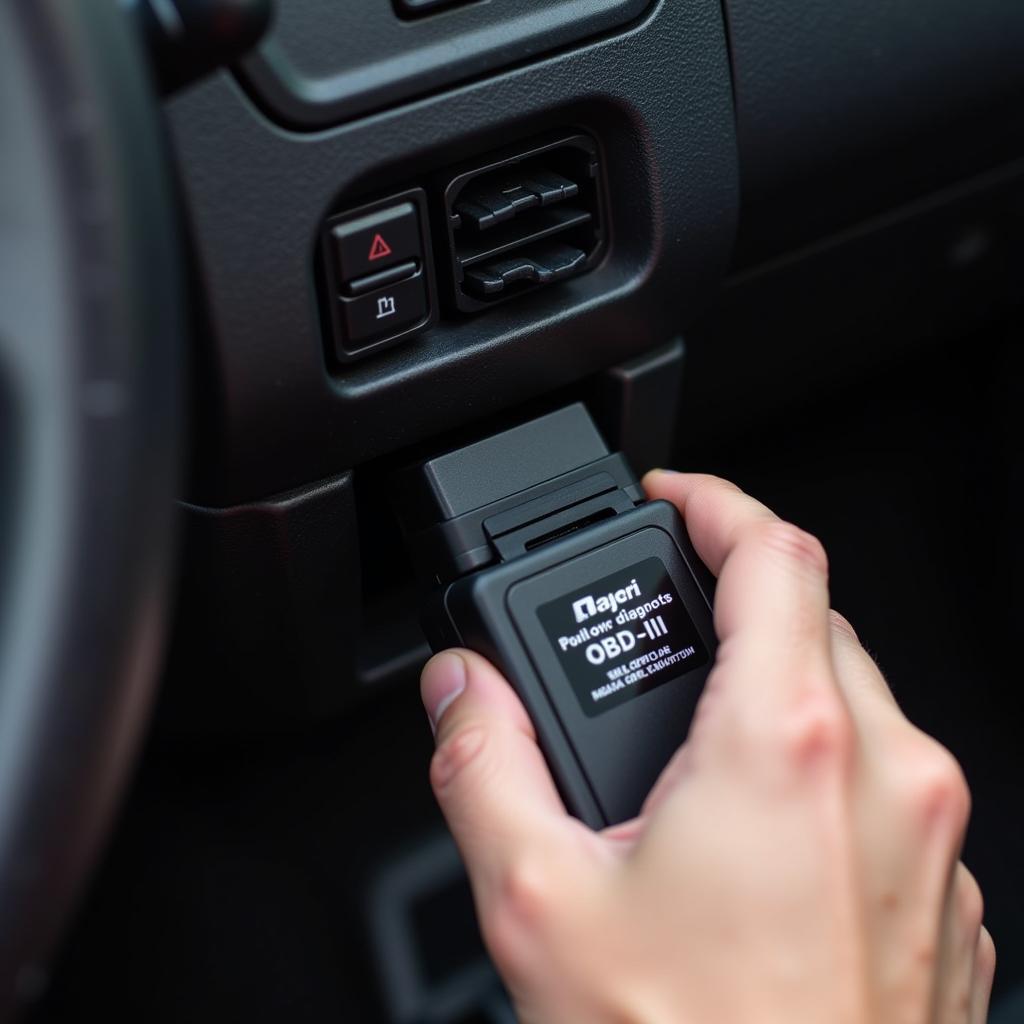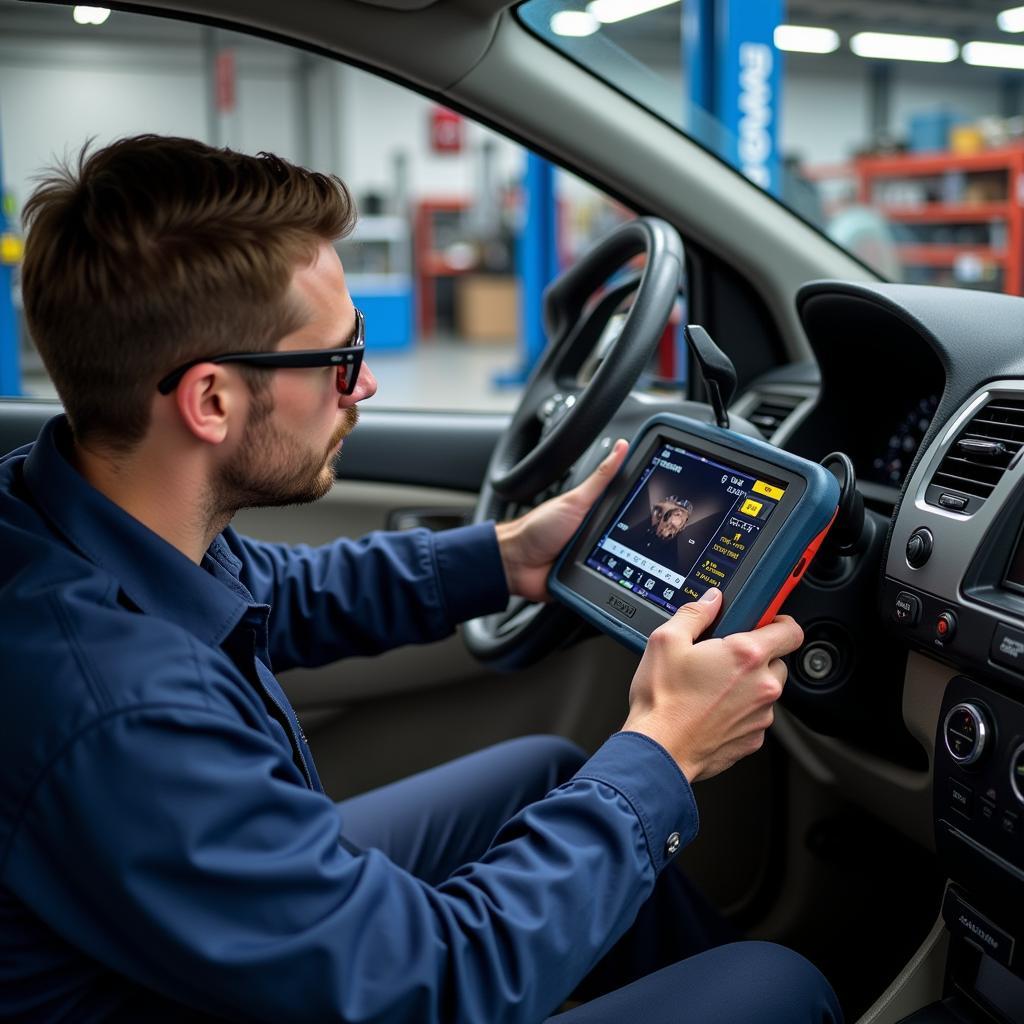Car air conditioning systems can be complex, and diagnosing issues often requires specialized equipment and expertise. Modern vehicles rely heavily on sensors and electronic control units (ECUs) to manage everything from temperature to airflow. When your car’s AC isn’t blowing cold air, a car diagnostic tool specifically designed for air conditioning systems can be invaluable in pinpointing the root cause.
How Car Diagnostic Air Conditioning Works
Car Diagnostic Air Conditioning tools, often used by professional mechanics, connect to your car’s onboard computer system, usually through the OBD-II port. These tools communicate with the vehicle’s ECU to retrieve diagnostic trouble codes (DTCs) related to the air conditioning system.
 Car Diagnostic Tool Connected to OBD-II Port
Car Diagnostic Tool Connected to OBD-II Port
These codes act like a digital language, indicating specific areas or components within the AC system that might be malfunctioning.
Here’s a breakdown of how car diagnostic air conditioning tools work:
- Connection: The diagnostic tool connects to your car’s OBD-II port.
- Communication: The tool initiates communication with the car’s ECU, requesting data related to the air conditioning system.
- Data Retrieval: The ECU sends back information such as:
- Diagnostic trouble codes (DTCs)
- Sensor readings (e.g., temperature, pressure)
- Actuator status (e.g., compressor on/off)
- Analysis: The diagnostic tool interprets the received data and presents it in a user-friendly format, often including code definitions and potential causes for the identified issues.
Common Car Air Conditioning Problems Diagnosed
Car diagnostic air conditioning tools can uncover a range of AC issues, including:
- Refrigerant Leaks: One of the most common problems, refrigerant leaks can lead to insufficient cooling.
- Compressor Failure: The compressor is the heart of the AC system, and its failure will result in a complete lack of cold air.
- Electrical Issues: Problems with wiring, sensors, or the AC control module can disrupt the system’s operation.
- Condenser or Evaporator Problems: Blockages or damage to these components can hinder heat exchange, reducing cooling efficiency.
 Mechanic Inspecting Car AC System with Diagnostic Tool
Mechanic Inspecting Car AC System with Diagnostic Tool
Benefits of Using Car Diagnostic Air Conditioning Tools
Utilizing car diagnostic air conditioning technology offers several key advantages:
- Accurate Diagnosis: These tools eliminate much of the guesswork involved in traditional AC diagnostics, leading to more precise identification of problems.
- Time Savings: By quickly pinpointing issues, these tools reduce the time spent troubleshooting, leading to faster repairs.
- Cost-Effectiveness: Accurate diagnosis helps prevent unnecessary repairs and part replacements, saving you money in the long run.
- Preventative Maintenance: Regular diagnostic checks can help detect minor issues before they escalate into major problems, extending the life of your AC system.
Finding the Right Car Air Conditioning Diagnostic Service
While some car diagnostic tools are available for DIY enthusiasts, it’s generally recommended to seek professional car air conditioning diagnostic service. Experienced technicians possess the knowledge to interpret diagnostic codes accurately and recommend the most effective course of action.
When choosing a service center, consider:
- Reputation: Look for reputable shops with positive customer reviews and a track record of quality AC repairs.
- Expertise: Ensure the technicians are experienced in car air conditioning diagnostics and have the necessary certifications.
- Equipment: Modern diagnostic equipment is essential for accurate and efficient troubleshooting.
Don’t overlook the importance of a well-functioning car air conditioning system. When you experience issues, car diagnostic air conditioning technology can be your key to staying cool and comfortable on the road.
FAQs about Car Diagnostic Air Conditioning
Q: Can I diagnose my car’s AC myself?
A: While some diagnostic tools are available for DIY use, professional mechanics with experience and specialized equipment are better equipped to interpret results accurately.
Q: How often should I get my car’s AC checked?
A: It’s a good idea to have your AC system inspected annually, preferably before the start of the hotter months.
Q: How much does a car AC diagnostic test cost?
A: The cost can vary depending on the location and the complexity of the issue. It’s best to contact your local repair shops for quotes.
Q: Can a car diagnostic tool fix my AC problem?
A: Diagnostic tools identify problems; they don’t fix them. Repairing the underlying issue will require additional work by a qualified technician.
Q: What is the OBD-II port, and where can I find it in my car?
A: The OBD-II port is a standardized connector used to access a vehicle’s onboard computer system. It’s typically located under the dashboard on the driver’s side.
Q: Are there any risks associated with using a car diagnostic tool on my car?
A: As long as the tool is used correctly and is compatible with your vehicle, there are minimal risks.
Q: Can car diagnostic tools be used for other car systems besides air conditioning?
A: Yes, many car diagnostic tools are designed to work with various vehicle systems, including the engine, transmission, airbags, and more. To find a solution that fits your needs, you can check out car diagnostic kit dublin.
Need Help with Your Car’s Air Conditioning?
Is your car’s AC not blowing as cold as it used to? Don’t sweat it! Our team of expert technicians at DiagFixPro is here to help. We utilize state-of-the-art car system diagnostic equipment, including specialized tools for air conditioning systems, to accurately diagnose and repair any issues.
Contact us today to schedule an appointment:
- WhatsApp: +1(641)206-8880
- Email: [email protected]
We’re available 24/7 to answer your questions and provide top-notch service. Stay cool on the road with DiagFixPro!

Leave a Reply